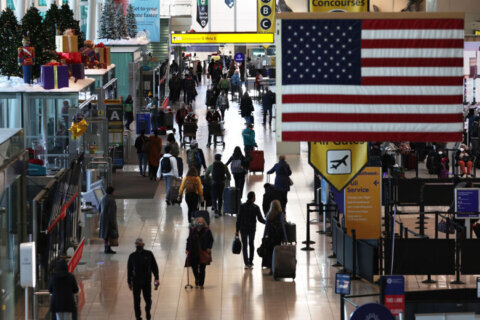This article was republished with permission from WTOP’s news partners at Maryland Matters. Sign up for Maryland Matters’ free email subscription today.
This content was republished with permission from WTOP’s news partners at Maryland Matters. Sign up for Maryland Matters’ free email subscription today.
The City of Baltimore filed a court motion on Friday asking for a judicial review of the state’s recent take over of the city’s Back River Wastewater Treatment Plant, the site of ongoing illegal discharges into the river.
At issue is a recent state order by Maryland Environment Secretary Ben Grumbles, requiring the city-owned treatment plant to immediately cease illegal discharges of water pollution into the river within 48 hours. City officials called this deadline arbitrary and “impossible,” rendering the state order illegal.
When the plant did not come into compliance within two days, Grumbles announced that the Maryland Environmental Service would temporarily take control of the Back River Wastewater Treatment Plant to oversee its operation and maintenance and ensure that the city operates in compliance with all terms of its discharge permit.
The Back River and Patapsco wastewater plants are already facing lawsuits in state court filed by Attorney General Brian Frosh on the behalf of the state Department of the Environment and in federal court by Blue Water Baltimore, a nonprofit water advocacy organization, over sewage discharges under the Clean Water Act
The Back River plant, the largest in the state and located in Dundalk, is limited to discharging up to 180 million gallons of treated wastewater into the Back River, a tributary of the Chesapeake Bay, under its permit. The plant has been regularly exceeding that threshold, which advocates say undermines Chesapeake Bay restoration efforts. Maryland and other Bay watershed states have all agreed to limit the amount of nutrients entering the Bay by 2025.
When the lawsuit was filed, Alice Volpitta, Blue Water’s Baltimore Harbor waterkeeper, said that the ideal resolution is a consent decree that would bring the Department of the Environment, Baltimore City Department of Public Works and Blue Water Baltimore together to find a solution. With a consent decree comes a legally binding schedule of actions that would help bring the plants back into compliance.
Last summer, Blue Water Baltimore found high levels of bacteria in the Harbor near the Patapsco plant and reported to the Department of the Environment, which initiated on-site inspections. Starting in October, city and state officials began working collaboratively to end all illegal discharges from the plants, but city officials pointed to challenges with staffing and supply chain shortages to explain the slow progress.
City officials said they have been meeting biweekly with state officials in an effort to draft a consent agreement that would help bring the plants back into compliance with their discharge permits. The state’s takeover order “caught the City off guard,” according to the court motion.
State officials knew “full well based on months of briefings and information sharing that there was no chance that the City would have miraculously resolved all issues at Back River in 48 hours,” the court motion states. The state order has created “confusion and threatens to delay and/or undermine the City’s efforts to improve operations at the Plant,” according to city officials.
However, Grumbles argued that state action was necessary because of the “shocking” inspection report completed by the Department of Environment at the end of March, which revealed maintenance issues including high concentrations of solids that prevented filters meant to remove nitrogen from functioning and hindering the plant’s ability to treat sewage.
At a meeting of the Baltimore City Senate delegation on Friday morning, Grumbles said the report included several shortcomings. “All the warning signals were going off,” he said.
Untreated sewage discharge is harmful because it pollutes waterways with excess nutrients that disrupt ecosystems and fuel harmful algae blooms. The algae can block sunlight and take away much of the oxygen in the water. With less sunlight and oxygen, plants and animals struggle to survive in a “dead zone.”
But Jason Mitchell, the director of Baltimore City Department of Public Works, challenged the state’s inspection, which reported seeing “dark grey wastewater.” Mitchell said the water was only dark because it was inspected on a cloudy day, and asserted that the effluent from Back River was “as clear as your normal drinking water.”
Grumbles said during the delegation meeting that while working towards a consent decree, the state could not agree to Baltimore’s timeline on bringing the plant back into compliance. But Mitchell said it was the first time he’d heard that Baltimore’s proposed timeline was too long and that he had not received a formal response from MDE regarding their strategic plan.
Baltimore has spent $10 million more than it originally budgeted to quickly fix the problems at Back River, according to the court motion. But Grumbles’ state order requires the Maryland Environmental Service to develop the same type of plan at the same time, Mitchell told senators. “DPW continues to not understand why we are duplicating this money,” Mitchell said. The plant still does not have a full staff, he said.
Mitchell also contended that the city began asking the state for help “months ago” and was surprised with the rapid move to step in and take over the plant only now.
When Sen. Mary Washington (D-Baltimore City) asked Grumbles why the Department of the Environment did not offer help when the city asked for it “months ago,” Grumbles said the state should not “hire people to help them,” but rather “insist that they manage the facility so that they are performing as designed.”
Washington asked how many on-site inspections the state has completed outside of Baltimore, pointing out that the Department of the Environment has been notoriously known for allowing facilities to operate under so-called “zombie permits,” or expired discharge permits. The department has a backlog of more than 200 zombie permits and state lawmakers passed a bill this legislative session to increase oversight of facilities operating on expired permits.
“We want processes to be fair, when you have a state take over of a facility, that rises to a level that it must absolutely affirm that there is equity throughout the system and that there has been opportunity for corrective action,” Washington said. “This pattern has a pattern of picking and choosing enforcement activities.”
After hearing both sides during the delegation meeting, Senate President Bill Ferguson (D-Baltimore City) commented that “something doesn’t add up.”
“It sounds like on one hand from the city…there had been ongoing conversations [with the Department of the Environment] and then all of a sudden, a two-day order came out which seemingly was impossible to comply with and then all of a sudden there was a takeover,” he said.
In a statement Friday afternoon, Grumbles said the “urgency and severity of the situation” required immediate action.
“The most effective way to change the slow-moving discussions was to issue the order, which allowed us to bring in extra support and expertise on a temporary basis from the Maryland Environmental Service,” Grumbles said. “We look forward to real progress and constructive engagement with the City.”







